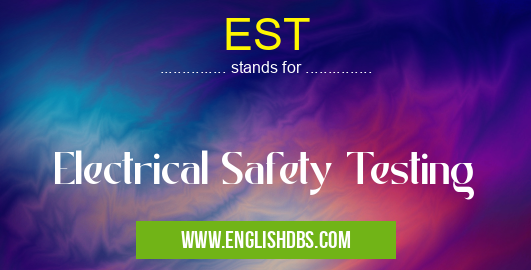What does EST mean in ELECTRONICS
Electrical Safety Testing, or EST, is an important part of maintaining proper safety standards for all electrical components and fixtures. It involves testing for current leakage, checking for proper wiring and insulation, and ensuring that all applicable regulations are being followed. This process can range from simple visual inspections to more advanced techniques such as infrared scanning. By performing EST on a regular basis, the risk of property damage and injuries due to electrical failure is minimized.

EST meaning in Electronics in Academic & Science
EST mostly used in an acronym Electronics in Category Academic & Science that means Electrical Safety Testing
Shorthand: EST,
Full Form: Electrical Safety Testing
For more information of "Electrical Safety Testing", see the section below.
Essential Questions and Answers on Electrical Safety Testing in "SCIENCE»ELECTRONICS"
What kind of tests are used during Electrical Safety Testing?
The type of test used depends on the complexity of the system being tested. Common tests include visual inspections, current leakage tests, insulation resistance tests, dielectric strength tests, ground continuity tests and voltage drop tests.
How often should Electrical Safety Testing be done?
The frequency of EST will vary depending on the type and complexity of electrical equipment in use. Local regulations may also dictate how often testing must be done. Generally speaking, it's recommended to perform EST on any new installations or changes at least annually, while older systems should be tested every three years at a minimum.
Are there any regulatory bodies that oversee Electrical Safety Testing?
Yes. Depending on your location, you may need to adhere to national or local guidelines established by organizations like NFPA (National Fire Protection Association), OSHA (Occupational Safety & Health Administration), and UL (Underwriters Laboratories). These organizations enforce standards meant to ensure the safe operation of electrical systems and protect people working in these environments from injury or death due to electrocution or other accidents caused by electrical failure.
Are there any special considerations when performing Electrical Safety Testing?
Yes. It's important that qualified personnel with specific training in this field perform EST in order to avoid any potential hazards due to inadequate testing procedures or incorrect interpretation of results. Additionally, certain areas may contain hazardous materials that require specialized protective gear before entering them for testing purposes; thus it's essential for technicians to be aware of their surroundings before beginning any work.
Are there any dangers associated with not performing Electrical Safety Testing?
Yes, not performing regular EST can result in serious hazards such as property damage or loss due to fires caused by faulty wiring or poor insulation; electrocution caused by contact with live wires; meltdowns caused by overloaded circuits; and many other potential risks due to the improper operation of electrical systems that have not been adequately tested according to industry standards.
Final Words:
Electrical Safety Testing is a critical component of ensuring a safe environment for both people working with electricity and those living around it. With proper knowledge and implementation of best practices related to this field, many risks can easily be avoided while still keeping up with local regulations as well as newer technologies like infrared scanning which allow more efficient testing without compromising safety standards.
EST also stands for: |
|
| All stands for EST |
